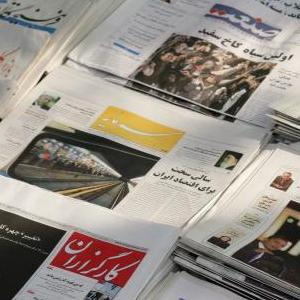Tehran’s Daily Newspaper Review

Following the Supreme Leader’s remarks on Monday, Iran interviewed observers who asserted that “tribal” –partisan- behavior in politics could drive the country backward. Iran has passed the level of sustained self-reliance in the production of agricultural crops, according to the newspaper. Iran also covered the opening ceremony of seven major industrial and civil projects with the attendance of Mahmoud Ahmadinejad in the western, less-developed province of Kermanshah. In his editorial, Ali-Akbar Javanfekr took advantage of Ayatollah Khamenei’s Monday speech to criticize incorrect political traditions, including what he called “political graft”, and scold the Conservatives for presenting an unsatisfying image of the government’s record.
Kayhan used one of its extravagantly large fonts to quote the Brookings Institute: “Take care of Saudi Arabia, Saudi Household’s fall is certain.” The inauguration ceremonies of industrial projects in Kermanshah, the riots in London, excessive water consumption by Tehran citizens and demonstrations in Israel were Kayhan’s other headlines. The demonstrations in the streets of Tel Aviv are not different from those happening in Cairo, Tunisia, Sana’a, Manama, Tripoli, Madrid and London, according to Kayhan’s editorial: all signal the collapse of a political bloc formed after WWII and based on the West’s political, security, military, economic and technological domination. The editorial also gave a relatively comprehensive analysis of the role of Russian-Israelis in the recent protests.
Resalat’s top headline was a remark by Deputy Majles Speaker and influential conservative figure Mohammad-Reza Bahonar, who claimed that maximal participation of citizens in the parliamentary elections is a major concern of the Principlists. “Media-shy government or government-shy journalists?” was a piece published on the front page of the conservative newspaper, in which the author mildly criticized the Mahmoud Ahmadinejad government’s attitude towards the media, while praising it for showing the highest tolerance for criticism in post-Revolution history. Resalat’s editorial divided the Supreme Leader’s Monday speech among high-ranking officials and dignitaries of the country into two categories of opportunities (ability to overcome threats, citizens’ trust, development despite sanctions, etc.) and threats (preoccupation with political disputes, neglecting the cultural assault of the enemy, inflation and unemployment, etc.)
Shargh’s front page focused on quotes from Mohammad-Reza Bahonar and Akbar Hashemi Rafsanjani. The Deputy Majles Speaker had suggested that it is better for the government not to administer the elections. He also criticized the Resistance Front, the alliance of ousted ministers and former supporters of Ahmadinejad in Majles, for having a “closed” point of view. Hashemi Rafsanjani stated, “humiliating valued figures of the Revolution”-- a likely self-reference-- “is humiliating the Revolution.” He also argued that the model of the current uprisings in the region, that is, protesting with minimum bloodshed, originally belongs to the Islamic Revolution, but the behavior of Iranian statesmen discourages revolutionaries from confessing that fact.
Tehran-e Emrooz’s top headline concerned the dire global economic situation and the G7’s emergency meeting. The newspaper also focused on Ayatollah Khamenei’s remarks, especially his comment that “the problem of unemployment and inflation is still unsolved.” The newspaper’s editorial gave an account of Middle East’s “Islamic Awakening” and the economic crisis in Europe, and the threats and opportunities they pose for Iran.
Vatan-e Emrooz’s choice of Ayatollah Khamenei’s remarks was more optimistic: “Iran at the zenith of prestige and respect”. Vatan-e Emrooz also quoted Central Bank Chairman Mahmoud Bahmani who said that the decision to remove four zeros from the national currency will not be implemented before citizens are ready. The London riots, fall of stock market indices and the Iranian football league were other headlines appearing on the newspaper’s front page.
* Note: Vatan-e Emrooz does not publish on Thursdays.
Trouble with understanding some terms? Check our Glossary of Iranian Political Terms.
Briefing
Hamshahri (Citizen) is the official daily newspaper of Tehran's Municipality. Its general directions in politics, culture and economy are determined by the mayor of Tehran, currently Mohammad Baqer Qalibaf.
Iran is the official organ of the administration.
Jomhouri-ye Eslami (The Islamic Republic) was known as the official organ of the Party of the Islamic Republic, founded in 1979 and disbanded in 1987. Currently, it is an open critique of Mahmoud Ahmadinejad's policies and is known to be a mouthpiece of Akbar Hashemi Rafsanjani.
Kayhan (Universe) is a hard-line conservative newspaper. Its editor-in-chief –currently Hossein Shari’atmadari- is appointed by Iran's Supreme Leader. Shari’atmadari’s editorials often spark off controversy and debate inside Iranian political circles.
Resalat (Mission) belongs to the moderate wing of the principlist camp. Resalat’s best known analyst is Amir Mohebbian, its political editor.
Shargh (East) is a moderate reformist newspaper. It was the most popular and influential reformist newspaper in its first period of publication which lasted from August 2003 until September 2006.
Tehran-e Emrooz (Tehran Today) is a ‘principlist reformist’ newspaper, connected to Mohammad Baqer Qalibaf.

